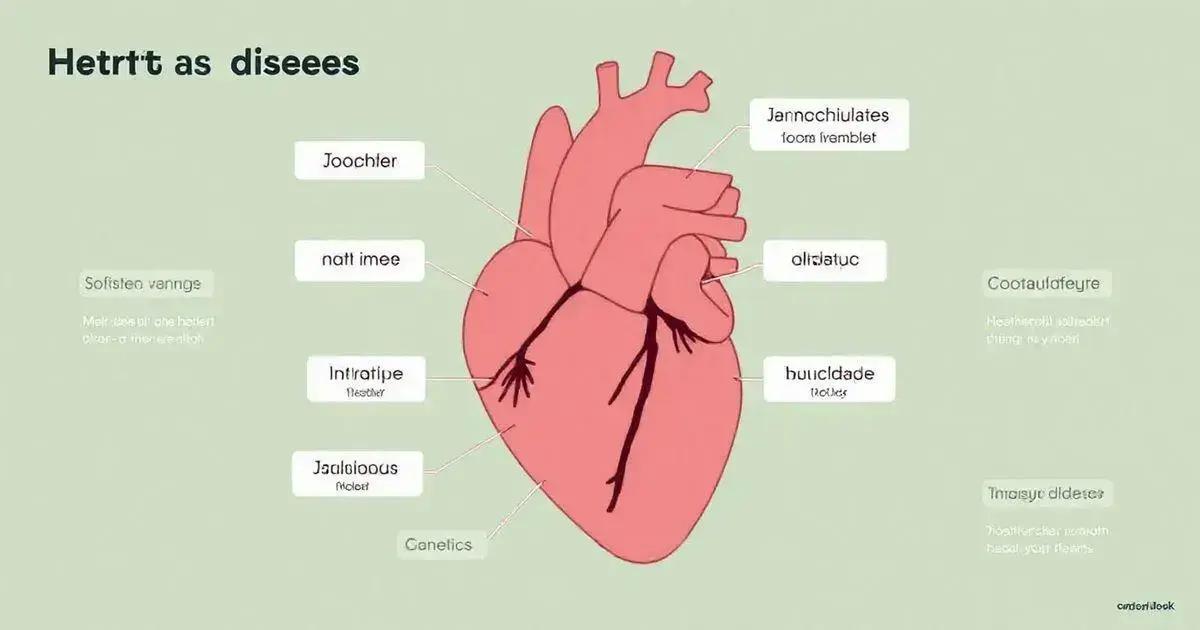To prevent heart disease with simple lifestyle changes, focus on a heart-healthy diet rich in fruits, vegetables, whole grains, and healthy fats, along with regular exercise of at least 150 minutes per week, while managing stress and avoiding smoking.
Heart disease is a leading cause of death for many individuals, yet it can often be prevented with simple lifestyle changes. By focusing on essential habits like proper nutrition and regular exercise, you can significantly reduce your risk of developing heart-related issues. This article will delve into how you can effectively prevent heart disease through easy and manageable lifestyle adjustments.
Understanding Heart Disease

Understanding heart disease is crucial for anyone looking to adopt simple lifestyle changes that can protect their health. Heart disease refers to a range of conditions that affect the heart, including coronary artery disease, heart attacks, and arrhythmias. These conditions can arise due to various factors, such as genetics, diet, and lifestyle choices.
Types of Heart Disease
The most common form is coronary artery disease, which occurs when the arteries supplying blood to the heart become narrowed or blocked. This can lead to heart attacks or even sudden cardiac arrest. Other forms of heart disease include heart failure, where the heart cannot pump enough blood to meet the body’s needs, and arrhythmias, which are irregular heartbeats that can affect how well the heart functions.
Risk Factors
Many risk factors contribute to heart disease. These include high blood pressure, high cholesterol, smoking, obesity, and a sedentary lifestyle. Additionally, conditions like diabetes and stress also play significant roles in increasing the risk of heart disease.
Importance of Early Detection
Recognizing the signs and symptoms of heart disease early can be lifesaving. Common symptoms may include chest pain, shortness of breath, and fatigue. Regular check-ups with a healthcare provider can help detect risks before they develop into severe problems.
By understanding what heart disease is and its risk factors, individuals can take proactive steps towards preventing it through healthy lifestyle changes. This knowledge empowers people to make informed decisions regarding their health and well-being.
Key Lifestyle Changes for Prevention

Making key lifestyle changes is essential to prevent heart disease and improve overall health. Start by focusing on your diet. Eating more fruits, vegetables, and whole grains can offer the nutrients your body needs while reducing unhealthy fats and sugars. Aim for a balanced diet that emphasizes lean proteins, such as fish and chicken, and limits processed foods.
Maintain a Healthy Weight
Carrying extra weight can strain your heart and increase your risk of heart disease. Setting realistic goals to lose weight can be beneficial. Combine healthy eating habits with regular exercise to achieve and maintain a healthy weight.
Quit Smoking
If you smoke, quitting is one of the best changes you can make for your heart health. Smoking damages blood vessels and raises blood pressure. Seek support through programs or counseling to help you quit.
Manage Stress
High stress levels can negatively affect your heart. Techniques such as meditation, deep breathing, and yoga can help reduce stress. Finding hobbies you enjoy or spending time with friends can also be beneficial for your mental well-being.
Incorporating these key lifestyle changes into your daily routine can greatly reduce your risk of heart disease and promote a healthier life.
Nutrition Tips to Combat Heart Disease

Nutrition plays a vital role in preventing heart disease. Making smart food choices can help improve your heart health. Focus on incorporating a variety of nutrient-rich foods into your diet. Here are some key nutrition tips to combat heart disease.
Eat More Fruits and Vegetables
Fruits and vegetables are packed with vitamins, minerals, and fiber. Aim for at least five servings daily to help lower blood pressure and maintain a healthy weight. Choices like berries, leafy greens, and citrus fruits are particularly beneficial for heart health.
Choose Healthy Fats
Replace saturated fats and trans fats in your diet with healthy fats. Olive oil, avocados, and nuts contain monounsaturated fats, which can help lower bad cholesterol levels. Omega-3 fatty acids, found in fish like salmon, can also reduce inflammation.
Limit Salt and Sugar Intake
High salt and sugar consumption can raise blood pressure and contribute to heart disease. Opt for low-sodium options when available, and limit processed foods that often contain high levels of salt. For sugar, try to reduce intake of sugary drinks, candies, and desserts.
Focus on Whole Grains
Whole grains like brown rice, quinoa, and whole-wheat bread are good sources of fiber. They can help lower cholesterol and control blood sugar levels. Aim to make at least half of your grain choices whole grains for optimal heart health.
Incorporating these nutrition tips into your daily routine can make a significant difference in reducing your risk of heart disease and promoting overall well-being.
Incorporating Exercise into Your Routine

Incorporating exercise into your routine is vital for heart health. Regular physical activity can help lower blood pressure, maintain a healthy weight, and strengthen the heart. Here are some effective ways to make exercise a part of your daily life.
Set Realistic Goals
Start by setting achievable goals. Aim for at least 150 minutes of moderate aerobic exercise each week. This can be broken down into smaller sessions, like 30 minutes a day, five days a week. Choose activities you enjoy to make it easier to stick to your routine.
Find Fun Activities
Exercise doesn’t have to be boring! Find fun activities that get you moving, such as dancing, hiking, or swimming. Joining a class or sports team can also make working out more enjoyable and social.
Make Use of Everyday Opportunities
Incorporate physical activity into your daily routine. Take the stairs instead of the elevator, walk or bike for short trips, or perform household chores like gardening or cleaning. These small changes add up over time.
Stay Consistent
Building a routine is key to making exercise a lasting habit. Schedule your workouts like appointments, and stick to your plan. Remember that it’s okay to start slow and gradually increase the intensity as you become more comfortable.
By incorporating regular exercise into your life, you can greatly improve your heart health and overall well-being. Every little bit counts, so stay active and enjoy the benefits!
In Summary: Simple Lifestyle Changes for Heart Disease Prevention
Heart disease can often be prevented through the adoption of simple lifestyle changes. Understanding the various forms of heart disease and identifying risk factors are crucial steps for maintaining heart health.
Key lifestyle changes, such as improving nutrition and incorporating regular exercise, can significantly lower the risk of heart disease. Emphasizing a diet rich in fruits, vegetables, whole grains, and healthy fats, while being mindful of salt and sugar intake, is essential.
Additionally, making exercise an enjoyable part of your daily routine enhances both physical and mental well-being. By setting realistic goals and finding fun activities, you can create a sustainable fitness plan.
By taking these proactive steps, you empower yourself to live a healthier life, free from the threat of heart disease. Start today and make choices that support your heart’s health!
FAQ – Frequently Asked Questions about Preventing Heart Disease
What are the main causes of heart disease?
Heart disease can be caused by a variety of factors including high blood pressure, high cholesterol, smoking, obesity, and a sedentary lifestyle.
How can diet impact heart health?
A heart-healthy diet rich in fruits, vegetables, whole grains, and healthy fats can lower blood pressure and cholesterol levels, reducing the risk of heart disease.
Is exercise really important for heart health?
Yes, regular exercise strengthens the heart, helps manage weight, lowers blood pressure, and reduces stress, all of which are important for heart health.
How much exercise should I aim for each week?
Aim for at least 150 minutes of moderate aerobic exercise each week, which can be broken down into manageable sessions.
Can stress affect my heart health?
Yes, chronic stress can increase blood pressure and negatively impact heart health. Managing stress is an important part of heart disease prevention.
What lifestyle changes can I make to prevent heart disease?
Key lifestyle changes include maintaining a healthy diet, exercising regularly, quitting smoking, managing stress, and keeping a healthy weight.













